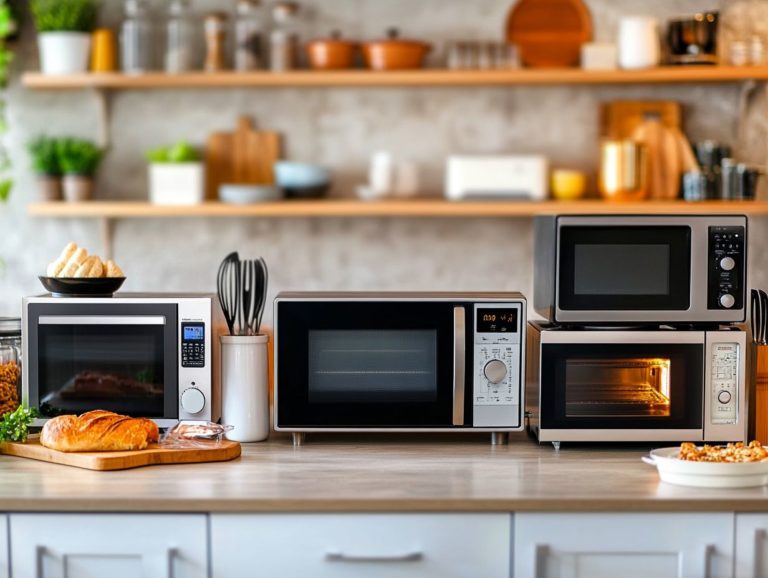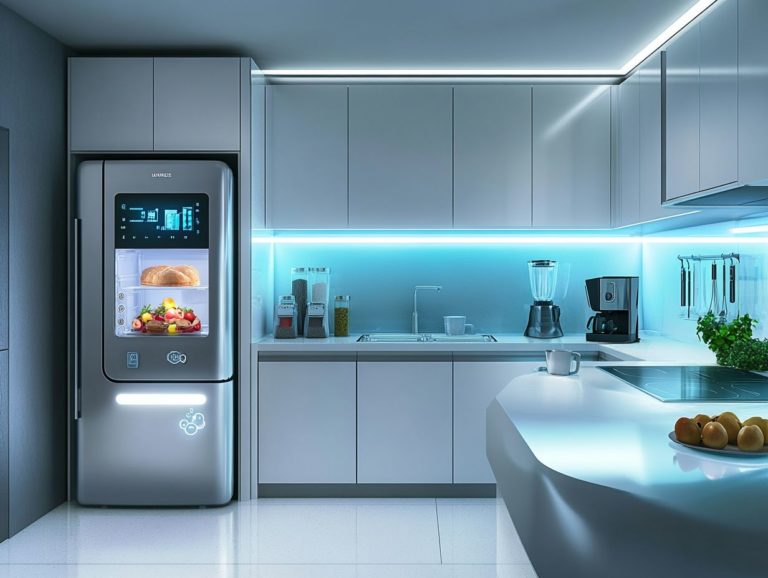5 Signs It’s Time to Replace Your Appliances
Are your home appliances beginning to reveal their age? If you’ve noticed inefficiencies, frequent breakdowns, or unusual noises, it may be time to consider an upgrade.
This article delves into five crucial indicators that suggest it’s time to replace your appliances. You’ll discover the advantages of making the switch, the common appliances that often require replacement, and invaluable tips for maintenance and disposal.
Stay engaged to ensure your home operates smoothly and efficiently!
Here’s a quick overview of what to watch for.
Contents
- Key Takeaways:
- 1. Appliances Are No Longer Efficient
- 2. Frequent Breakdowns and Repairs
- 3. Strange Noises and Smells
- 4. Outdated Technology
- 5. High Energy Bills
- When Is the Best Time to Replace Appliances?
- Frequently Asked Questions
- What are the signs that it’s time to replace my appliances?
- How often should I replace my appliances?
- Is it better to repair or replace my appliances?
- What should I consider when replacing my appliances?
- Can I replace my appliances one at a time or should I replace them all at once?
- What are some signs that my appliance may need professional repair instead of replacement?
Key Takeaways:
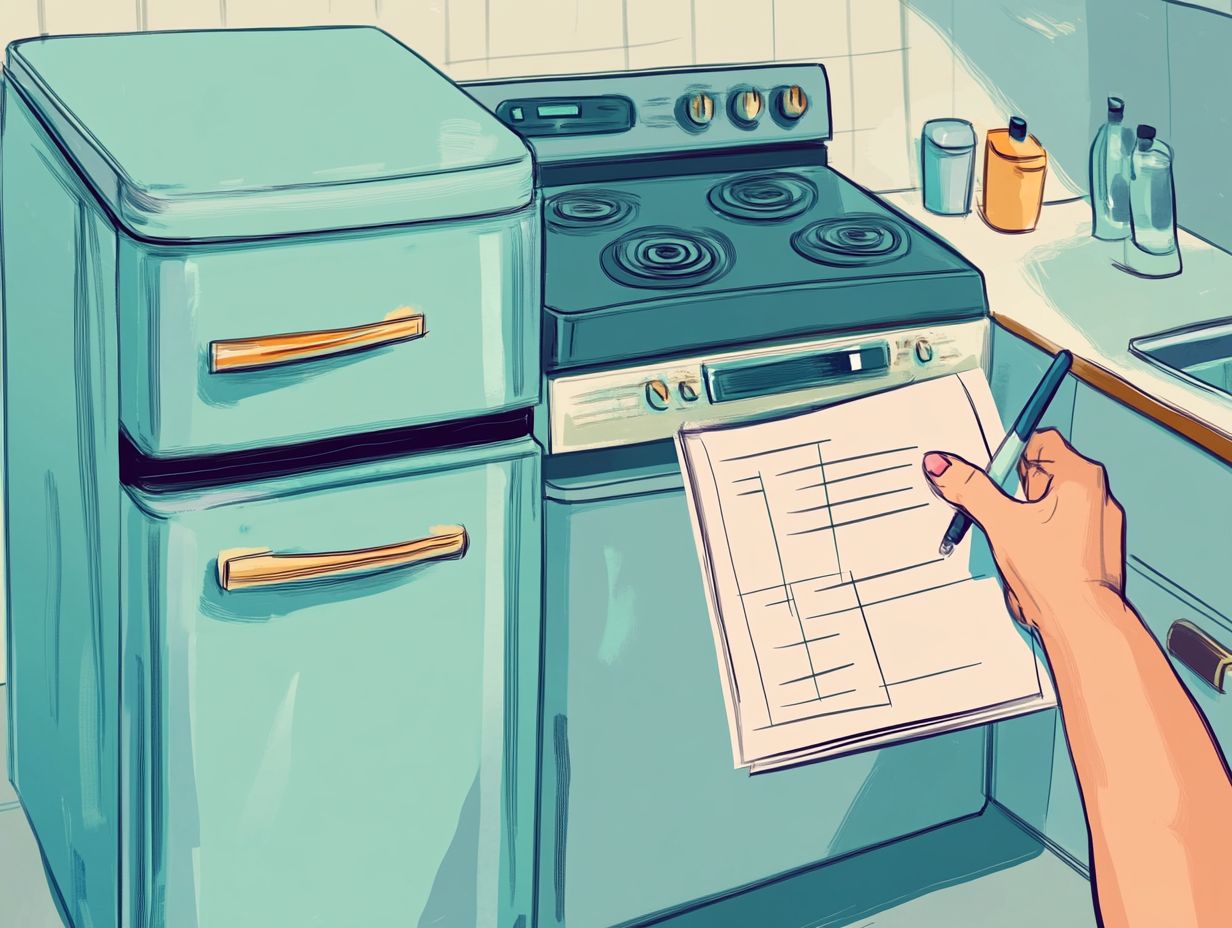
Efficiency is key—old appliances can cause high energy bills and frequent breakdowns.
Strange noises and smells are signs that something is wrong—consider replacing your appliances before they completely break down.
Outdated technology can lead to inefficiency and higher energy bills—upgrade to newer models for better performance.
1. Appliances Are No Longer Efficient
As your appliances age, they often lose their efficiency. This leads to higher energy consumption, soaring utility bills, and increased mechanical issues that can disrupt your daily routine.
It’s important to recognize the signs that your household appliances are falling short of energy efficiency standards. This awareness is key to effective home management.
Old technology can escalate costs and shorten the lifespan of your appliances, affecting both your budget and your home’s safety and energy conservation efforts.
Experts like Michael Clarke stress the importance of addressing these issues early. He points out that appliances older than ten years can consume up to 25% more energy than modern ones.
If you notice excessive noise or irregular behavior, catch minor issues before they escalate into catastrophic failures.
Industry statistics reveal that replacing inefficient appliances can lead to savings of up to 30% on your annual energy bills, highlighting the financial advantage of staying alert.
Acting quickly on these warning signs can help you save money and stay safe.
2. Frequent Breakdowns and Repairs
Frequent breakdowns and constant repairs indicate that your appliances may be nearing the end of their useful life. This often leads to both costly repairs and disruptions in your daily routine.
For example, if your washing machine consistently struggles to spin or drain effectively, these are clear signs that it’s showing its age.
As malfunctions increase, the likelihood of a complete breakdown becomes clearer. Recognizing when it’s time to call in a professional is vital.
If your washing machine starts making unusual noises or your dishwasher begins to leak, it’s time to call a technician.
Minor issues, like a clogged filter or a loose hose, can often be easily fixed with straightforward DIY solutions. Assess the severity of the problem and your comfort level with repairs before making a decision.
Don’t ignore these signs—take action now to ensure your home stays efficient and safe!
3. Strange Noises and Smells
Strange noises and smells coming from your appliances can be unsettling. They often serve as red flags for potential mechanical issues or electrical hazards that threaten both appliance safety and your household’s well-being.
For instance, the incessant whirring of a vacuum cleaner could indicate a blocked filter or a broken part. Similarly, rhythmic humming from your refrigerator might suggest a defrosting session that’s overdue.
And don’t ignore the sharp scent of gas wafting from your stove or dryer; that’s a clear signal for immediate action.
To ensure your appliances operate seamlessly, regularly inspect them for unusual sounds, sniff out odd odors, and maintain a clean environment to prevent clogs or leaks.
If you notice any warning signs, knowing when to call in a professional can save you time and money while keeping safety at the forefront.
Stay vigilant and proactive to protect your home and family!
4. Outdated Technology
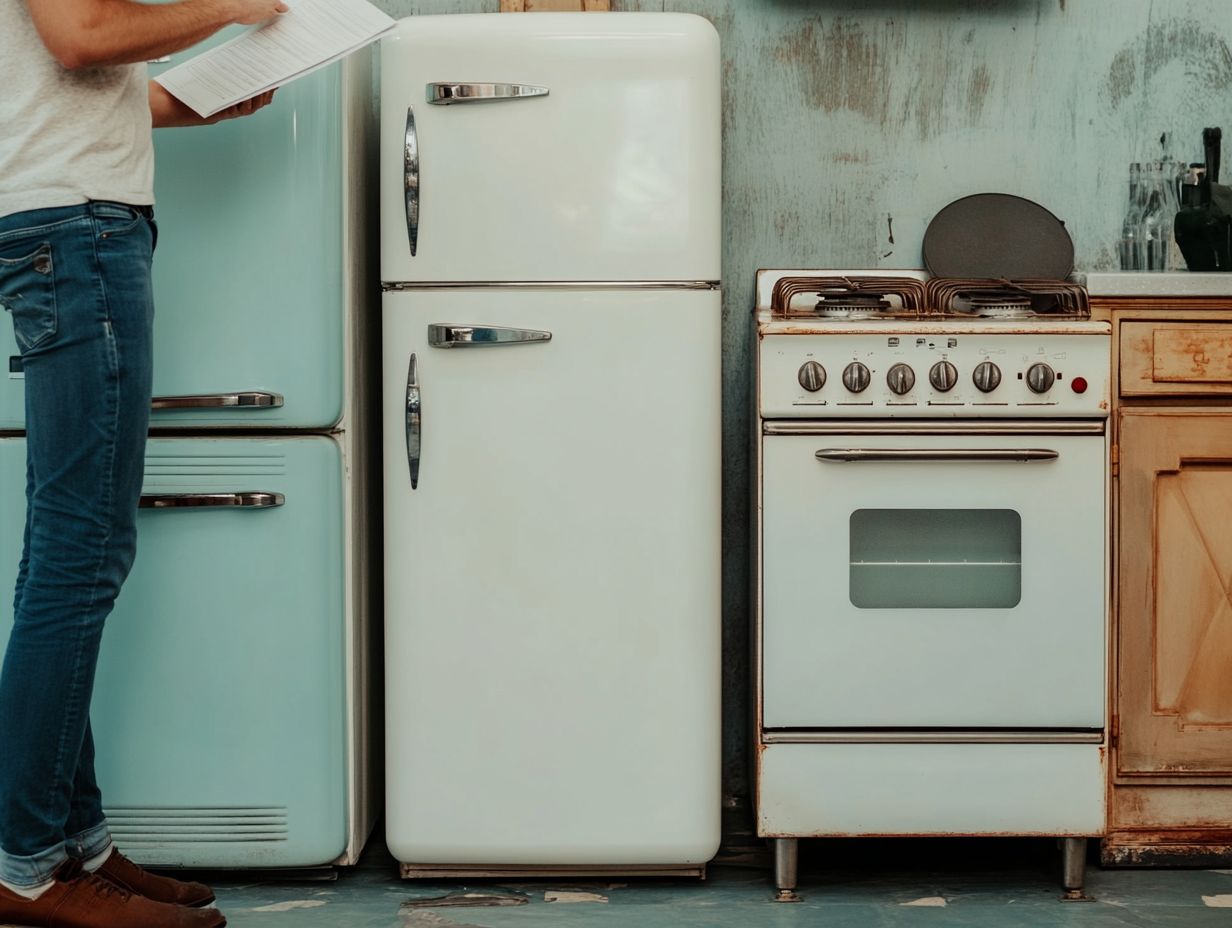
Outdated technology in your appliances can hurt performance and waste energy. Upgrading is essential for a more sustainable home.
Older models, like traditional dishwashers and refrigerators, consume more energy and water. This leads to higher utility bills. These appliances lack modern features that enhance efficiency and contribute to a larger carbon footprint.
Choosing new, energy-saving models means improved functionality and lower operational costs. As more consumers recognize these benefits, market trends are shifting towards eco-friendly appliances that offer savings and peace of mind—aligning with a more conscientious lifestyle for future generations.
5. High Energy Bills
A sharp rise in your energy bills often links back to older, less efficient appliances that guzzle power, impacting both your finances and the environment.
Regularly reviewing your utility bills for fluctuations is crucial; sudden spikes can suggest appliance inefficiency. Consistent use during certain months should not result in unexpected increases.
Pay close attention to your kWh consumption figures. Compare them to previous months and similar periods from past years.
Smart meters give you real-time insights into your energy use. Discover which devices are draining your wallet!
Transitioning to new, energy-saving models, marked by an Energy Star rating, boosts performance and leads to significant savings over time—making it a savvy investment for your future.
When Is the Best Time to Replace Appliances?
Determining the optimal time to replace your appliances requires careful consideration of several factors. These include the appliance’s lifespan, household safety concerns, and the frequency of expensive repairs.
An aging appliance, especially one over a decade old, may not just become inefficient; it could also pose safety hazards, such as electrical malfunctions. Look for signs that replacement is necessary.
Frequent repairs leading to mounting bills or noticeable declines in performance—like longer cooking times or a refrigerator struggling to maintain a consistent temperature—are strong indicators.
Pay attention to energy efficiency ratings. Models with low ratings can inflate your utility bills. Timing your replacements with seasonal sales can enhance your budget efficiency, making it a wise financial move.
What Are the Benefits of Replacing Old Appliances?
Replacing your old appliances boosts household efficiency and offers numerous advantages, including reduced energy consumption, enhanced functionality, and increased safety with modern, eco-friendly options.
Statistics show that upgrading to energy-saving models can save you up to 30% on monthly utility bills. Choosing reputable brands like Bosch and Samsung may even qualify you for lower appliance insurance premiums, as newer models feature advanced safety features.
Consider the benefits of innovative technologies like smart sensors and high-efficiency ratings. They save energy and decrease the need for frequent repairs, making the switch a smart investment.
By embracing these advancements, you enjoy both financial savings and a positive environmental impact in your home. Embrace the change today and start enjoying a more efficient, cost-effective home!
What Are the Most Commonly Replaced Appliances?
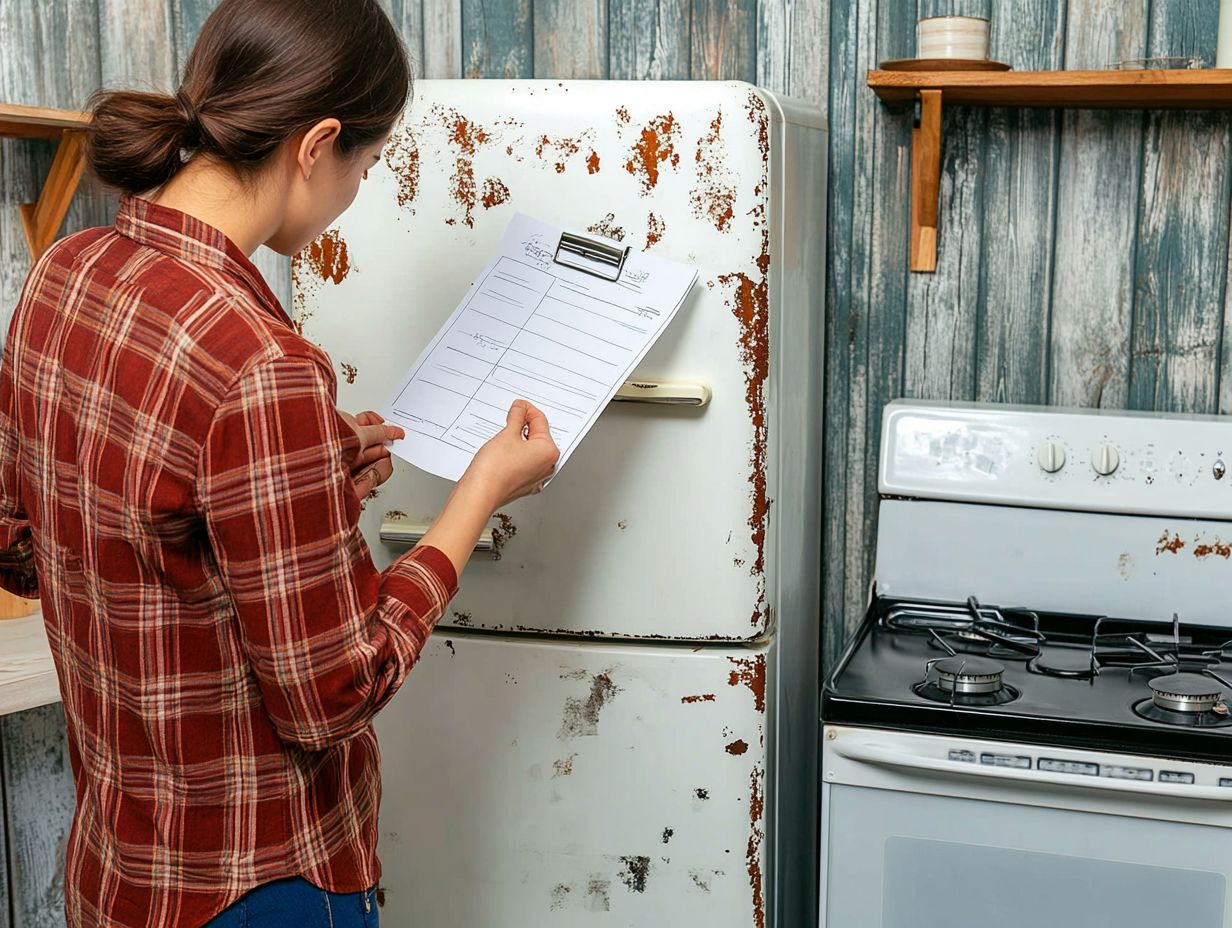
You likely find yourself replacing common appliances like washing machines, refrigerators, dishwashers, and vacuum cleaners. All of these play vital roles in your daily life and contribute significantly to the upkeep of your home.
These essential gadgets are crucial not just for functionality but also for enhancing the efficiency of your household tasks. In fact, studies show that about 60% of consumers opt to replace their refrigerators every 10 years. This emphasizes the importance of reliability in food preservation.
Washing machines and dishwashers often make their way onto the replacement list every 7 to 12 years. This reveals a consumer trend that prioritizes performance and energy efficiency.
Meanwhile, vacuum cleaners, with a typical replacement cycle of 5 to 8 years, reflect your household’s commitment to cleanliness and convenience. By understanding these trends, you can confidently choose the right time to invest in new appliances!
How Can One Determine the Lifespan of an Appliance?
Understanding how to measure the lifespan of your appliances requires careful evaluation of factors such as usage patterns, maintenance history, and the manufacturer’s guidelines. These insights can significantly inform your decisions regarding timely replacements.
Examining the average lifespans specific to each type of appliance can provide you with valuable knowledge. For instance, a washing machine usually lasts around 10 to 15 years, depending on its make and model.
Seeking advice from qualified professionals can uncover potential issues that might impact longevity. Engaging in regular maintenance practices—such as cleaning filters, checking hoses, and ensuring appliances are free of debris—is vital for prolonging their functionality.
By taking these proactive steps, you can not only enhance your appliances’ performance but also postpone the expensive necessity of replacement.
What Are Some Tips for Maintaining Appliances?
Regular maintenance is essential for ensuring the longevity and efficiency of your household appliances. By implementing effective cleaning tips and scheduling routine check-ups, you can save yourself from costly repairs down the line.
Consider establishing a schedule that includes inspecting seals, replacing filters, and cleaning ventilators. This proactive approach significantly reduces wear and tear on your appliances.
Be vigilant about any unusual sounds or smells, as these can serve as early warning signs of potential malfunctions. For certain tasks—like calibrating temperature settings in your refrigerator or testing water lines in your dishwasher—it’s wise to call in professional technicians to avoid any further complications.
Engaging with professionals for more intricate repairs guarantees that the work is done correctly. This provides you with peace of mind while safeguarding your investment in these essential appliances. Start your appliance maintenance routine today and keep your home running smoothly!
How Can One Properly Dispose of Old Appliances?
Properly disposing of old appliances is essential for both environmental sustainability and household safety. You’ll want to ensure that hazardous materials are managed responsibly while maximizing recycling opportunities.
For many households, this process may seem daunting. However, gaining an understanding of local regulations and available recycling programs can simplify things considerably.
It’s crucial to identify whether your local waste management services offer special collection days for bulky items or if there are designated drop-off locations specifically for appliances.
Many businesses and community organizations also run eco-friendly disposal initiatives. This provides you with a chance to recycle your old items in an environmentally conscious way.
Don’t let your old appliances gather dust! Act now to ensure safe and responsible disposal! By exploring local options, you can not only help reduce landfill waste but also foster a community spirit around responsible disposal, ensuring that valuable materials are reused and hazardous components are handled safely.
Frequently Asked Questions

What are the signs that it’s time to replace my appliances?
1. Constant breakdowns and repairs – If your appliances are constantly breaking down and needing repairs, it’s a clear sign they may be nearing the end of their lifespan.
2. Outdated technology and features – As technology advances, older appliances can become inefficient. This makes replacing them necessary for better performance.
3. High energy bills – If your energy bills are high, your appliances may not be using energy efficiently. This could indicate it’s time for a replacement.
4. Strange noises or smells – Unusual noises or smells from your appliances can signal internal problems. Often, these issues are too costly to repair.
5. Visible wear and tear – Cracks, rust, or other noticeable signs of wear show that your appliances may be at the end of their life. Don’t wait! If you see these signs, it’s time to act!
How often should I replace my appliances?
Wondering how long your appliances should last? On average, most appliances should be replaced every 10-15 years. However, this can vary based on usage, maintenance, and brand.
Is it better to repair or replace my appliances?
This depends on the situation! If your appliance is still relatively new and needs a minor repair, fixing it can be more cost-effective. However, if the repair is costly and the appliance is old, replacing it might be the better choice.
What should I consider when replacing my appliances?
When replacing your appliances, think about energy usage, features, and brand reputation. Don’t forget to consider your budget! It’s essential to ensure the new appliance fits and functions well in your kitchen or home.
Can I replace my appliances one at a time or should I replace them all at once?
This decision is up to you and your budget! Some people prefer to replace appliances one at a time as they break down. Others choose to replace them all at once for consistency in features and design.
Keep in mind that replacing multiple appliances together can be more cost-effective regarding installation and delivery fees.
What are some signs that my appliance may need professional repair instead of replacement?
If your appliance is still relatively new and the issue seems minor, it may be worth trying to repair it first. Signs it may need professional help include:
- If the issue is a simple fix.
- If the appliance is still under warranty.
- If the repair costs are significantly lower than replacing the appliance.
